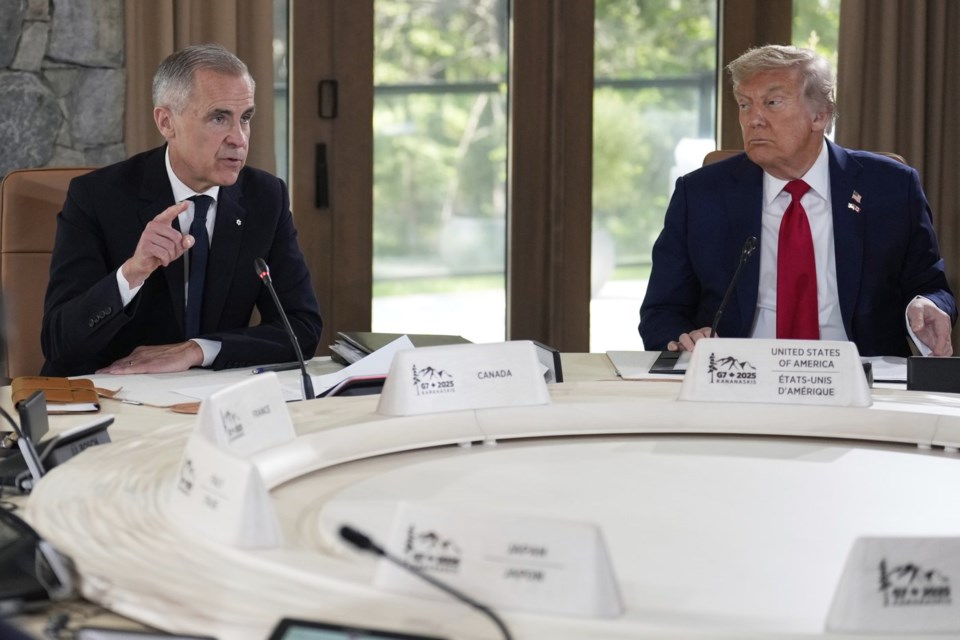OTTAWA — Prime Minister Mark Carney will be meeting with his cabinet and Canada's premiers to discuss U.S. President Donald Trump's new threat to slap 35 per cent tariffs on Canadian goods next month.
The Prime Minister's Office announced there will be a cabinet meeting on Tuesday to discuss ongoing Canada-U.S. trade negotiations. Carney's office said he also will meet with the premiers on July 22 as they gather for the annual Council of the Federation conference in Huntsville, Ont.
Carney said Thursday his government will "steadfastly" defend workers and businesses. In a late night post on social media, Carney said Canada will continue to work to secure a trade deal with the U.S. by a revised deadline of Aug. 1.
In a letter to Carney on Thursday, Trump threatened to impose 35 per cent tariffs on Canadian goods by that date — evidently setting a new deadline for the trade talks that were supposed to wrap up by July 21.
A White House official said the 35 per cent tariff rate is only expected to be applied to goods already hit with a 25 per cent import tax. This would exempt goods compliant with the Canada-U.S.-Mexico Agreement on trade, called CUSMA, plus energy and potash imports that face a 10 per cent tariff rate.
The official said no final policy paper has been drafted and Trump has not yet made a final decision.
Canada also faces additional U.S. tariffs on steel, aluminum and automobiles, as well as a U.S. plan to introduce tariffs on copper on Aug. 1.
Asked about the tariff threat while leaving the White House Friday morning, Trump told reporters that "it was sent yesterday. They called. I think it was fairly well received."
A spokeswoman for the Prime Minister's Office said Carney and Trump did not speak Thursday night. She said that while officials from both countries meet daily as trade talks continue, Thursday's meeting took place before Trump sent his tariff letter.
Trump's letter said if Canada works to stop the flow of fentanyl into the United States, he may consider a tariff adjustment. U.S. government data shows the volume of fentanyl seized at the United States' northern border is minuscule compared to the amounts recovered at the border with Mexico.
Trump declared an emergency at the northern border in order to use the International Economic Emergency Powers Act of 1977, or IEEPA, to slap Canada with economywide tariffs in March. He partially paused the duties a few days later for imports compliant under CUSMA.
It's not clear whether Trump's use of IEEPA to hit nearly every nation with duties will survive a looming legal challenge. The United States Court of Appeals for the Federal Circuit is scheduled to hear arguments on July 31 — a day before the tariffs are set to return.
The U.S. Court of International Trade said in May that Trump does not have the authority to use the national security statute for the fentanyl and so-called "reciprocal" tariffs. Trump's administration promptly appealed the decision and it's expected to go all the way to the Supreme Court.
Trump has continued to use the tariff lever to pressure countries to sign trade deals. Canada was the latest nation to receive correspondence from Trump this week outlining higher duties.
Federal Industry Minister Mélanie Joly said at a time of uncertainty, Canada must strengthen its economic relationships with other nations.
"We are not alone in this world," she said in Ottawa during a Friday news conference with Stéphane Séjourné, the visiting European Commission executive vice-president for prosperity and industrial strategy. "We need to be closer to our allies."
When asked about plans for retaliation, Joly said Canada and China are the only nations that have taken such a stance so far.
"We have had already a very strong response," Joly said
Alberta Premier Danielle Smith discouraged Ottawa from imposing further retaliatory tariffs in a post on social media, saying it would "constitute a tax on Canadian consumers and businesses and only weaken Canada’s economy further."
Smith said the federal government should also drop "Trudeau-era anti-resource development laws."
In a social media post, Ontario Premier Doug Ford said "we need to come together" and develop a plan to protect Canadian workers, business and communities.
Bloc Québécois Leader Yves-François Blanchet said on social media that his party supports increasing trade ties with the European Union. He also accused Carney of "failing" by focusing on investments in the oil and gas sector, which he said would only affect trade "well after Donald Trump's departure."
In Washington, Sen. Jeanne Shaheen said the latest tariff threat against America's northern neighbour undermines the Trump administration's own negotiations to reach a trade deal, while the "consistent attacks" on Canada have damaged a "vital relationship."
The Democrat from New Hampshire said she's heard many complaints about tourists not coming from Canada and lost business due to Trump's trade war.
"The American people and the overwhelming majority of my colleagues in Congress reject this short-sighted and costly trade war with Canada," Shaheen said in a news release.
This report by The Canadian Press was first published July 11, 2025.
David Baxter and Kelly Malone, The Canadian Press



